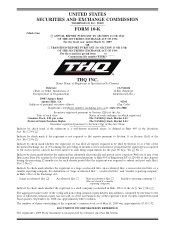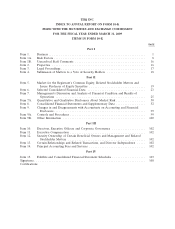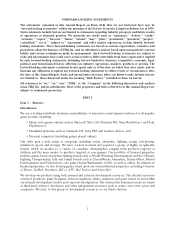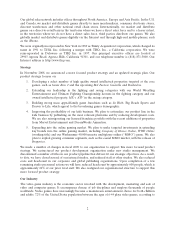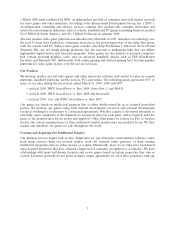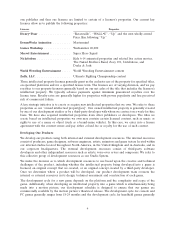THQ 2009 Annual Report Download - page 16
Download and view the complete annual report
Please find page 16 of the 2009 THQ annual report below. You can navigate through the pages in the report by either clicking on the pages listed below, or by using the keyword search tool below to find specific information within the annual report.The global economic downturn could reduce demand for our products and increase volatility in our stock
price, which could result in a material adverse impact on our business, operating results, and financial
position.
Current uncertainty in global economic conditions pose a risk to the overall economy as consumers and
retailers may defer or choose not to make purchases in response to tighter credit and negative financial
news, which could negatively affect demand for our products. Additionally, due to the weak economic
conditions and tightened credit environment, some of our retailers and distributors may not have the same
purchasing power, leading to lower purchases of our games for placement into distribution channels.
Consequently, demand for our products could be materially different from our expectations, which could
negatively affect our business, our results of operations and our financial condition.
In addition, periods of economic uncertainty may result in increased volatility in our stock price. The
decline in our market capitalization and our financial performance during the latter half of the quarter
ended December 31, 2008, resulted in an impairment of all of our goodwill as of December 31, 2009. If we
experience further deterioration in our financial performance as a result of these and other factors, we
could be required to recognize additional impairment charges related to software development, licenses,
and other long-lived assets in future periods.
Our lack of earnings over the past two fiscal years has reduced our cash position. While the company has
plans in place to generate positive cash flow in fiscal 2010, further deterioration in global macroeconomic
conditions or failure to meet our current plan for fiscal 2010 could result in us having to pursue additional
funding from public or private sources to meet our cash needs, or to curtail or defer currently-planned
expenditures, or both.
Because we did not generate positive cash flow in fiscal year 2009, our cash, cash equivalents and
short-term investments have decreased from $317.5 million as of March 31, 2008 to $140.7 million as of
March 31, 2009. We expect to generate positive cash flow from operations in fiscal 2010. We expect to
achieve this with net sales at similar levels to fiscal 2009, cost savings achieved under our business
realignment, as well as lower cash spend on product purchases and license payments. In addition, on
May 6, 2009 we signed a commitment letter for a revolving credit facility of up to $35.0 million with Bank
of America, NA (‘‘B of A’’). Although we believe these actions will improve our cash position, there can be
no assurance that we will generate positive cash flow in fiscal 2010 or increase our cash position.
Additionally, a further deterioration in global macroeconomic conditions or our failure to meet our
current plan for fiscal 2010 could result in further deterioration in our cash position, which could result in
us having to pursue additional funding from public or private sources to meet our cash needs, or to curtail
or defer currently-planned expenditures, or both.
The decrease in our stock price and cash position over the last year may affect our ability to do business with
key third parties.
The significant decrease in our stock price over the last year and the decrease in our cash and cash
equivalents may cause certain third parties, such as the platform manufacturers, our licensors, vendors and
landlords to impose greater restrictions upon us that could negatively affect the profitability of our
business and further deteriorate our current cash position. For example, pursuant to the terms of
established contracts, the platform manufacturers could require that we pay cash in advance for the
product that we order from them and our landlords could require larger security deposits. Additionally, it
may make it more difficult to enter into agreements with such parties in the future and any such
agreements may contain more onerous contract terms, which could negatively affect our ability to operate
profitably.
Because of these and other factors affecting our operating results and financial condition, past financial
performance should not be considered a reliable indicator of future performance, and investors should not
use historical trends to anticipate results or trends in future periods.
9


